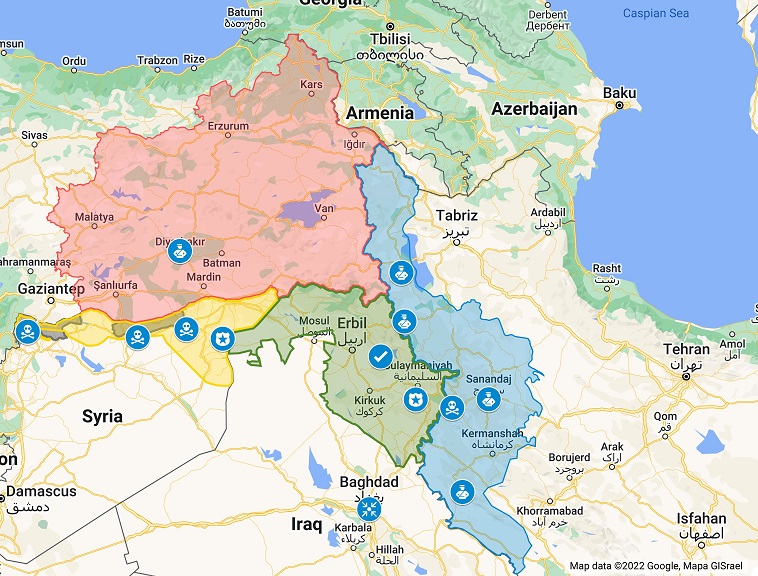1.5K
A weekly brief of events occurred in the Kurdistan regions of Iran, Iraq, Syria, and Turkey.
Iran
- Urmia’s Islamic Revolutionary Court sentenced two female activists, Zara Sedighi and Ilham Chobdar, to death on charges of “spreading corruption on earth” for promoting “homosexuality” and “cooperation” with opposition media outlets. Sedighi and Chobdar were active in Iran’s LGBT community, and Iranian authorities arrested them when they tried to flee to Turkey in July 2021. Concurrently, Ilam’s Islamic Revolutionary Court sentenced a Kurdish activist named Ahmed Darza to four years and four months in prison for “propaganda against the state.” Likewise, a criminal court in Piranshahr sentenced a Kurdish activist to two years and seven months in prison for “membership in a Kurdish opposition party.” Lastly, Iranian authorities arrested seven Kurdish activists, including Freishta Hussini in Bokan and Akshan Jamshidi, Madih Muradi, and Faradin Rahimi in Sanandaj.
- Iranian security forces wounded 11 Kurdish border porters (kolbars) near Baneh and Nowsud. According to the Hengaw Organization for Human Rights, seven kolbars have been killed, and 34 have been wounded since August 1. Despite the risks, however, many Kurds become kolbars because of Iranian Kurdistan’s poor living conditions and high unemployment rates.
Iraq
- Muqtada al Sadr followed up his “resignation” from Iraqi politics by refusing to send a representative to the second round of the “national dialogue” sponsored by Iraqi Prime Minister Mustafa al Kadhimi. “The political situation and the resulting disputes hold everyone responsible for maintaining stability, protecting the country from crises, supporting calm efforts, preventing escalation and violence, and adopting a national dialogue,” read a statement from al Kadhimi’s office. Meanwhile, Baghdad witnessed a period of relative calm after last week’s clashes, but fighting between al Sadr’s Sayara al Salam militia and the Iranian-backed Asaib Ahl al Haq organization killed four people, including a senior member of Sadr’s militia, in Basra on Wednesday. Moreover, a lawyer from Babil Governorate named Thia’adeen al Bediri filed a lawsuit against Speaker of Parliament Mohammed al Halbousi for accepting the mass resignation of al Sadr’s parliamentary bloc in June. Bediri said Halbousi’s acceptance of the resignation was “dictatorial” and outside the bounds of the “democratic system.” Iraq’s Federal Supreme Court will hold a hearing to address the matter on September 25.
- Kurdish local security forces (Asayesh) arrested an ISIS (Da’esh) terrorist in Chamchamal on Thursday. The Asayesh previously rolled up a Da’esh terror cell that was plotting assassinations and attacks in Bazyan on August 29. Further, a suspected Da’esh terrorist opened fire on local police and Asayesh personnel in Sulaymaniyah Governorate’s Qaradagh District on Sunday evening and wounded ten. The Asayesh claimed the attacker was killed after he refused to surrender.
Syria
- A fifth victim of the August 19 Turkish drone strike on a UN-sponsored special education center for girls near al Hasakah died on Monday. Concomitantly, Turkey and its proxies shelled Ain Essa, Tal Tamer, and other locations along the Turkish-occupied zone’s border with the Autonomous Administration of North and East Syria (AANES). The Syrian Democratic Forces (SDF) claimed Turkish attacks killed 19 civilians and wounded at least 46 in August. On another note, the SDF and local security forces continued counter-Daesh operations in al Hol camp for the second week in a row. The SDF announced it has arrested 121 Da’esh suspects, including 15 women, and discovered 16 tunnels so far.
- Turkish-backed Islamist organizations angered northeastern Syria’s Kurds by building a new settlement for non-Kurds in occupied Afrin. Syrian Kurds view the community’s construction as another Turkish attempt to alter the region’s demographics. An organization called “Kuwait al Rahma” previously settled hundreds of Arabs in Afrin in May.
Turkey
- Turkish police arrested Semra Güzel, a Kurdish lawmaker of the Peoples’ Democratic Party (HDP) in Istanbul after the Turkish Grand Assembly lifted her immunity on March 1. Güzel is accused of ties with a deceased member of the Kurdistan Workers’ Party (PKK) after a leaked picture by pro-Turkish government outlets showed the lawmaker in Iraqi Kurdistan with a PKK fighter. However, Güzel said she visited her fiancee during the peace process, similar to other lawmakers negotiating the peace deal with the government’s permission. “The immoral detention of our deputies and the fact that this operation is used as propaganda material by the government with a low-level and ugly language is an indication of the government’s weakness. “read a statement by the HDP. Güzel released a short message from her prison to supporters describing her arrest as “an illegal process” and assuring that “hope will win, peace will win, women will win.” Seven other Turkish parties also condemned Güze’S arrest.
- In Diyarbakir, Turkish authorities handed the remains of a PKK fighter in a bag to his father after seven years. The fighter Hakan Arslan was killed by the Turkish military in Sur in 2015. The act raised anger among the Kurds, and the HDP denounced the act. In 2020, Turkey also sent the remains of another PKK fighter via the post office.

